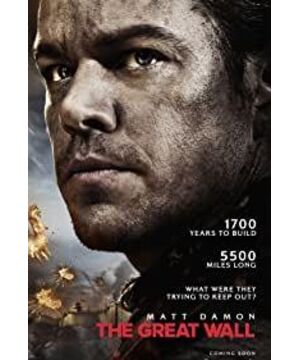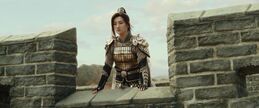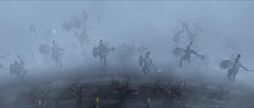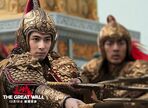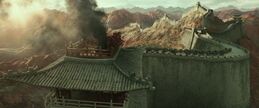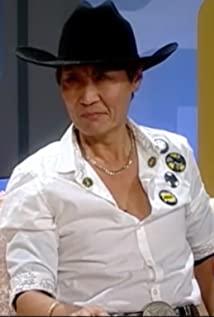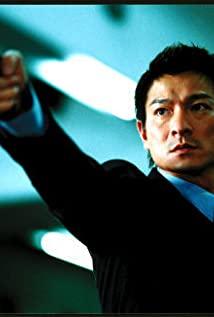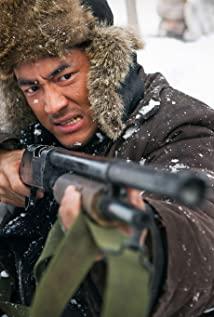Columns of "troops" in colorful costumes, a "moving point" (there is the word "laughing point", I will create a "moving point" for Wiliam here) as a negative male protagonist, a facial paralysis female protagonist , a coach who can't even handle his own security measures, a group of strange monsters who can't avoid obstacles but want to dominate the world, plus a barrier that can be easily broken through, together constitute this gorgeous farce.
The film has a lot of holes in the plot. One of the most obvious is the change in Wiliam's attitude. William's original purpose was to come to China to steal black powder and then resell it at a high price in Europe for huge profits. However, after only witnessing the bravery of the Chinese troops and the fearlessness of the He army, he quickly changed his aspirations, and was inspired to fight with the Chinese side to "protect mankind" and achieve higher life aspirations. This shift is irrational from common sense. As a European mercenary, Wiliam should be someone who pays attention to the spirit of contract and works for his employer in exchange for his livelihood. But to help the Chinese army in this business, if the film wants to portray Wiliam as a noble person, then Wiliam should be completely spontaneous and not asking for anything in return. Therefore, this conflicts with Wiliam's identity, unless Wiliam doesn't even want to be a mercenary and wants to settle down in China. Also, the film only uses a small amount of space to tell about Wiliam's transformation. Wiliam is influenced by General Lin's constant emphasis on his trust and the heavy casualties in the Chinese troops. For the former, the director specially set up a play to emphasize "trust", but did not integrate the character transformation into the details of the event process. Plus Jing Tian's icing on the cake made the director's intentions and future plot trends completely exposed to the audience's eyes. In this way, everyone's interest in watching the film almost disappeared in the first half of the film due to this awkward literary drama and such poor performance techniques.
The loopholes in the plot also include the Great Wall. The title of the film is "The Great Wall", but the climax does not take place on the Great Wall. If the climax does not correspond to the title of the film, then think about it, except for the battle scene on the Great Wall, does any other part have anything to do with the Great Wall? Of course there is - the Great Wall actually symbolizes the determination and perseverance of the Chinese troops in defense. However, the image of the Great Wall and the spirit of the Chinese side are completely set from the beginning of the film, and there is no change in the whole film. And the same will naturally be overshadowed by changes that are more likely to attract the attention of the audience. The so-called change is precisely the turn of Wiliam mentioned above. So this is a paradox: Is the film about the spirit of the Great Wall and its symbols, or about the mental journey of a Western mercenary? Although it is okay to forcefully explain that Wiliam was moved by the spirit of the "Great Wall" of Chinese soldiers, what role does that "trust", a background completely independent of Wiliam and the concept of the Great Wall, play in it? Therefore, this self-contradictory plot setting cannot convince the audience at all. Another point, the Great Wall is undoubtedly a symbol of the indestructibility of the Chinese army, but why was someone pierced through a hole in the middle and sneaked through it? Since it's the Great Wall that won't fall, don't let it leak - how can this be symbolic? It can be said that this film has a problem in the general direction of the script. This is the shared responsibility of screenwriters, directors, and producers.
I am too lazy to comment on the actor part. Professional actors such as Huang Xuan and Zhang Hanyu were reduced to decorations, while Jing Tian, Lu Han and other casual actors were heavily involved. This configuration, coupled with the unpredictable plot and awkward lines, make it impossible for every actor to start. The casting director was bribed, the screenwriter was useless, and the audience knew it at a glance.
A bad book, bad actors, can't make a good film if you give it to any director, but if the director's skills are good, at least it can be remedied to an average level. Therefore, even if the director cannot make major changes to the script at the request of the producer, he should make more efforts in the scheduling of shots and scene design. But from the point of view of the final film, the director did not do his job well, even for such a commercial film that does not have very high requirements on the story.
First, the motion design is like a sponge. People are either bumped into unnatural projectile motions, or they just pick up weapons and throw a pestle and a bow anywhere. This is one of the most taboo aspects of motion design - lack of interaction. Action scenes do not see the interaction between the two sides of the fight, so each shot is no different from watching a few stills. Some people think that throwing an axe to shoot an arrow, making a special effect for a close-up and adding 3D can fool the audience. However, the 21st century has now passed more than ten years. This kind of drama may not have been able to attract audiences ten years ago, not to mention this era that is already full of special effects.
Second, there are problems with the combat design. The biggest problem is He Jun. Even if they are all superhumans, they can still hold their spears tightly to kill the enemy when they are bungee jumping. Isn't there a little spear per person? Judging from the film, a spear can only support two monsters at most, and then people are either eaten, or the spear is abandoned, and there are at least several thousand monsters - this cost is a little big. In fact, in order to deal with the situation of enemy soldiers sieging the city through ladders (similar to the gluttony climbing the city wall in the film), the ancient Chinese have designed many defensive weapons. For example, the defensive weapon stile, which is improved from the farm implement flail. It is recorded in "Mozi·Beichengmen": "In the second step, a stile, a long axe, and a long vertebra are placed; twenty guns are placed in the second step." It can be seen that Lian Ting appeared as early as the pre-Qin period . Another example is that the rollers are densely covered with long nails and connected to the winch, and when used, they are thrown into the yaksha (also known as "staying the guest", and you can know what kind of terror this weapon is by listening to this nickname). Another example, recorded in the Ming Dynasty Mao Yuanyi's "Wubei Zhi·Qi Shi", the extremely lethal Langya Pai: "The Langya Pai is made of elm locust wood, five feet long, four feet five inches wide, and three inches thick. Hundreds of wolf-tooth iron nails, all five inches long and six taels in weight, were nailed to the racket, three inches out of wood, a bladed knife embedded on all sides, and nail rings at the four corners. The enemy is attacking the city with ants attached to it, and it is difficult to attack by itself." Similar to the above three cases, there were also a series of defense weapons such as borrowed vehicles in ancient China. Sitting on such an arsenal, but in order to introduce the concept of so-called "trust" in a strange way, at the expense of rationality, it is really puzzling to choose a high-cost suicide defense.
Furthermore, the costume design is comparable to a stage show. Although the armies have traditional Chinese animal names on them, the costumes are still reminiscent of the Armored Warriors, Dinosaurs and the like—everyone (or unit) wears a different color. Although this design is not so ugly and annoying, at least it completely strips away the general tone of the Great Wall's antique flavor, making people feel that this is watching a modern fashion show. In fact, too modern styling is not just for this film, but also a common problem with many historical films in China today. The armors of some costume dramas have reached the level of handicrafts, and they have no intention of borrowing from the real situation of history; some of the modern anti-Japanese war dramas have ingenious hairstyle designs, which are no different from modern popular hairstyles, and the sense of historical substitution is extremely poor. Although director Zhang Yimou is an expert in stage effects, those artistic skills cannot be used at will, especially in such a film set in history.
Finally, the director's attitude towards the film. Some people say don't blame the director, he has worked very hard, and he is too busy between the opening ceremony of the G20 summit and the shooting of this film. I would say, one has to focus. Either direct the opening ceremony or make a good film, choose one of the two. Many directors spend five or six years making a film that is not good enough. How can you guarantee that you can guide the opening ceremony well and steer such an international blockbuster? Judging from the response, the opening ceremony seems to be well directed, and "The Great Wall" has completely collapsed. In an interview, Zhang Yimou, the director of the film, compared the film to a "Godzilla Jaws"-style Hollywood monster blockbuster, and he said it was a "standard" blockbuster. But in the end, the film was a far cry from a real blockbuster, becoming a complete farce, losing tens of millions of dollars, and becoming a laughing stock at the Oscars that year.
However, we should still respect the director's efforts (even in the case of being cheated of movie ticket money). Judging from the status of this film, this is a Sino-US joint venture film with huge investment, which can be said to play a role in paving the way for future Sino-foreign joint venture films. Looking at this point alone, Zhang Yimou deserves our respect because he has the courage to take this step - after all, the success of future generations requires the failure of predecessors to accumulate experience.
However, no matter what, Zhang Yimou did not shoot to the level he should have. It cannot be denied that there are external factors (foreign producers who do not understand Chinese culture, etc.), but he and the entire crew can do far better than a farce.
(One star for Industrial Light and Magic: Taotie moves freely and is polished more realistically; the Great Wall, Bianliang and other major scenes are also well done)
View more about The Great Wall reviews


